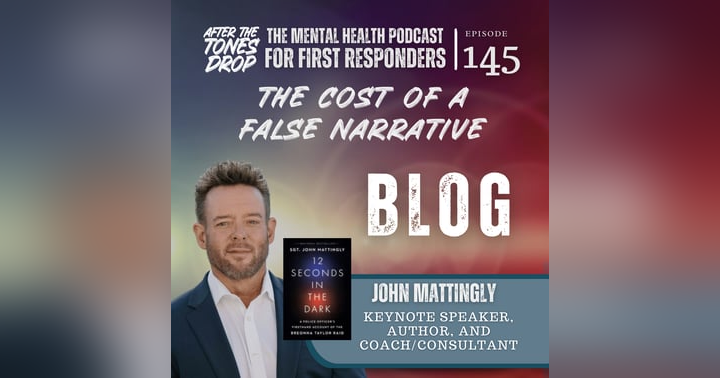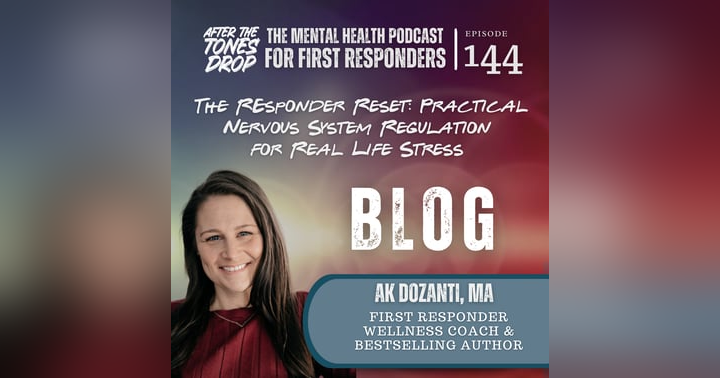The Other Side of Suicide: What We Don’t Talk About Enough

There are conversations we all know need to happen, but nobody wants to be the first one to break the silence. Suicide in first responder culture is one of them. Not because we don’t care. Not because we’re cold. But because the truth hurts, and when it hurts this much, we’d rather numb it, bury it, or outrun it.
But here’s the thing: pain doesn’t disappear just because we refuse to look at it. And as Carrie Matthews reminds us in Episode 132 of After the Tones Drop, the pain of suicide doesn’t end with the person we lose. It transfers.
The Ripple Effect No One Sees Coming
Carrie is a Chicago police officer, a peer supporter, a mental health advocate, and the daughter of an officer who died by suicide. When she talks about this topic, it’s not academic. It’s not conceptual. It’s lived, raw, and real.
She describes the moment her world split open, when the person who had protected her entire life suddenly wasn’t there. The life she knew evaporated in a second. And what followed wasn’t just grief, it was confusion, anger, guilt, isolation, and a silence so loud it could swallow a person whole.
That’s the part we rarely talk about. The collateral damage. The people left behind are trying to make sense of something that refuses to make sense. The ones who have to carry the questions that will never have answers.
Carrie puts language to an experience many survivors can’t articulate. And in doing so, she gives permission for others to finally speak.
“We are not fine”, and honesty is its own kind of courage
In our conversation, Carrie said something that hit me straight in the chest:
“We are not fine. And it’s okay to say that.”
If you’ve spent any time in the first responder world, you know this truth: you have been conditioned (and likely, expected) to be okay, even when you’re not. You tough it out. You compartmentalize. You laugh it off. You minimize. You go back to work the next day like nothing happened.
But the body remembers. The nervous system remembers. And sooner or later, the mask stops protecting you.
Carrie’s vulnerability is not weakness, it’s leadership. She models what it looks like to be human and serve. To carry trauma and keep moving. To be hurting and still show up for others.
This is the kind of courage we need more of.
The Power of Community and Checking In, For Real
One theme that comes up again and again in this episode:
We have to check on our people. And we have to mean it.
Not the drive-by “you good?”
Not the polite nod.
Not the “call me if you need anything.”
Real checking in. Real listening. Real presence.
Carrie talks about how the smallest acts, as simple as someone calling back later, someone showing up uninvited, someone sitting in silence beside you, can be the difference between spiraling alone and finding your footing again. Humans are not meant to heal in isolation, especially not responders who are trained to be self-reliant at all costs.
Community isn’t a luxury in this line of work. It’s survival.
Raising the Bar on Wellness
One of the most powerful parts of our conversation was this shared realization:
“Not being suicidal” is not a wellness standard.
We need to stop setting the bar at zero.
“Wellness” shouldn’t mean “I’m hanging on by a thread, but I’m still here.”
“Wellness” shouldn’t mean “I’m not actively in crisis.”
“Wellness” shouldn’t mean “I can still do my job, so I must be fine.”
We deserve (you deserve) a full life, not just an unbroken one.
Carrie is passionate about shifting the culture from reactive to proactive. From stigma to support. From silence to prevention.
And she doesn’t just talk about it, she offers resources that actually help.
Resources Carrie Recommends
These are programs she personally knows, trusts, or has benefited from:
Haymarket Center, First Responders Retreat
A peer-supported, trauma-informed retreat dedicated specifically to first responders dealing with stress, trauma, addiction, or suicide loss.
🔗https://haymarketcenter.org/retreat
22Zero, Trauma Reset Program (with Dan Jarvis)
A groundbreaking approach designed to neutralize the emotional intensity of traumatic memories without forcing people to relive them.
🔗 https://www.22zero.org
Connect With Carrie Matthews on LinkedIn
Carrie actively shares resources, supports responders, and advocates for mental wellness in public safety.
🔗 https://www.linkedin.com/in/carrie-matthews-369427335
This Episode Is a Lifeline
If you’ve ever felt alone in your pain...
If you’ve ever wondered whether things can get better...
If you’ve ever lost someone and struggled to understand...
If you’ve ever been afraid to ask for help…
This conversation is for you.
It’s honest.
It’s heavy.
It’s human.
And it’s full of hope.
I’m grateful for Carrie’s courage, her heart, and her willingness to say the things most people avoid. Her story is a reminder that silence kills, but connection heals.
If you’re carrying something today, please know this:
You don’t have to.
You’re not a burden.
You are not alone.
And there is help.
🎧 Listen to Episode 132: The Other Side of Suicide:
https://www.afterthetonesdrop.co/carrie-matthews
Your healing might begin with one story. Maybe it begins with this one.



